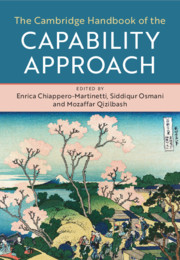Book contents
- The Cambridge Handbook of the Capability Approach
- The Cambridge Handbook of the Capability Approach
- Copyright page
- Dedication
- Contents
- Figures
- Tables
- Contributors
- Foreword
- Acknowledgements
- General Introduction
- Part I Historical Antecedents and Philosophical Debates
- Introduction to Part I
- 1 The Capabilities Approach and the History of Philosophy
- 2 Karl Marx and the Capabilities Approach
- 3 Utility and Capability
- 4 Intellectual History and Defending the Capabilities Approach
- 5 Sen, Smith and the Cambridge Tradition
- 6 The Capability Approach to Well-Being and Freedom from the Viewpoint of Welfare Economics and Social Choice Theory
- 7 Resources or Capabilities?
- 8 Taking Multidimensionality Seriously
- 9 The Capabilities Approach and Political Liberalism
- 10 Selecting a List
- 11 Individualism and the Capability Approach
- 12 The Politics of Wonder
- Part II Methods, Measurement and Empirical Evidence
- Part III Issues in Public Policy
- Index
- References
10 - Selecting a List
The Capability Approach’s Achilles Heel
from Part I - Historical Antecedents and Philosophical Debates
Published online by Cambridge University Press: 11 November 2020
- The Cambridge Handbook of the Capability Approach
- The Cambridge Handbook of the Capability Approach
- Copyright page
- Dedication
- Contents
- Figures
- Tables
- Contributors
- Foreword
- Acknowledgements
- General Introduction
- Part I Historical Antecedents and Philosophical Debates
- Introduction to Part I
- 1 The Capabilities Approach and the History of Philosophy
- 2 Karl Marx and the Capabilities Approach
- 3 Utility and Capability
- 4 Intellectual History and Defending the Capabilities Approach
- 5 Sen, Smith and the Cambridge Tradition
- 6 The Capability Approach to Well-Being and Freedom from the Viewpoint of Welfare Economics and Social Choice Theory
- 7 Resources or Capabilities?
- 8 Taking Multidimensionality Seriously
- 9 The Capabilities Approach and Political Liberalism
- 10 Selecting a List
- 11 Individualism and the Capability Approach
- 12 The Politics of Wonder
- Part II Methods, Measurement and Empirical Evidence
- Part III Issues in Public Policy
- Index
- References
Summary
Capability theorists disagree on how to determine, for normative purposes, which capabilities are to be treated as basic, with Martha Nussbaum and Amartya Sen taking opposite views. This chapter will scrutinize this list debate. It has two aims. First, it argues that some distinction between basic and non-basic capabilities is an inherent commitment of capability theories, but that there are many more options for responding to the capability-selection problem than a procedure of democratic deliberation (Sen) or a philosophical criterion of neo-Aristotelian flourishing (Nussbaum). A whole range of possible procedures and philosophical criteria could be combined with the capability metric. Second, it responds to a forceful challenge raised by Ian Carter, who argues that capability theorists should not endorse the selection of specific capabilities as basic (either democratically or philosophically) at all. In his view, this will always have paternalistic implications; instead he proposes that the maximization of ‘capability as such’ should be the goal. In response, I distinguish well-being-based and autonomy-based capability theories, and argue that while Carter’s challenge is valid against the former, it fails against the latter.
Keywords
- Type
- Chapter
- Information
- The Cambridge Handbook of the Capability Approach , pp. 188 - 205Publisher: Cambridge University PressPrint publication year: 2020

